09 Nov 2017 - {{hitsCtrl.values.hits}}
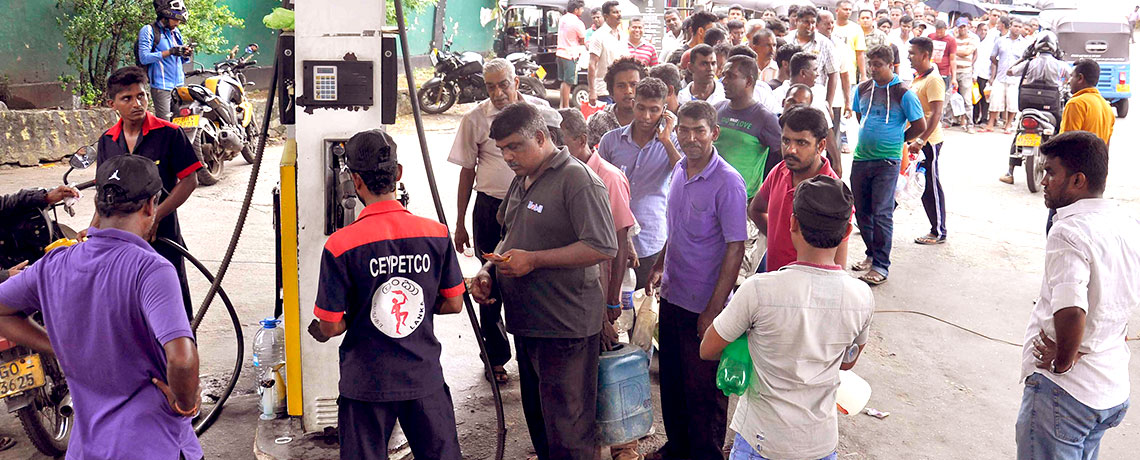
 The impending fuel crisis has caused much inconvenience to the public. Long queues of three wheelers, cars and other vehicles and complaints by the public indicate the severity of this crisis. The rejection of a shipment imported by the Lanka Indian Oil Company (LIOC) was one of the main reasons behind this shortage. The LIOC accounts for 16% of market share in the supply of petrol in the country and officials claim that to date they have not supplied any substandard fuel to the consumers.
The impending fuel crisis has caused much inconvenience to the public. Long queues of three wheelers, cars and other vehicles and complaints by the public indicate the severity of this crisis. The rejection of a shipment imported by the Lanka Indian Oil Company (LIOC) was one of the main reasons behind this shortage. The LIOC accounts for 16% of market share in the supply of petrol in the country and officials claim that to date they have not supplied any substandard fuel to the consumers.
Several rejections in fuel shipments, a major delay in the arrival of a ship under the Ceylon Petroleum Corporation (CPC) and a sudden breakdown of the Sapugaskanda oil refinery, added more fuel to the fire. Hence, the Daily Mirror sheds light on the main reasons why this shortage took place and what measures could be taken to mitigate such situations in future.
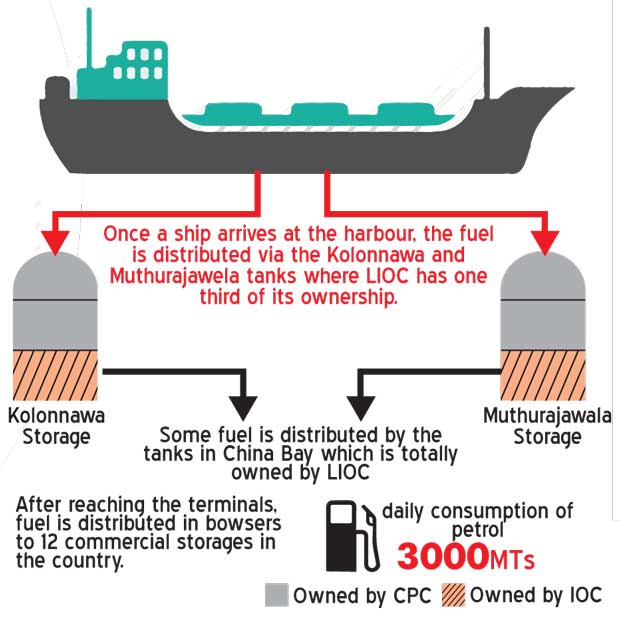
What went wrong?
On October 15, 2017, a ship containing petrol brought down by the LIOC was rejected by two experiments. Upon rejection, the ship was returned but according to sources, it has been docked in Trincomalee for over 16 days in an attempt to distribute this fuel back to the consumers. According to regulations, if one stock is rejected the Company has to get down an alternative stock which was supposed to reach Sri Lanka on October 31, 2017. But several days later the Company has refused to bring it down.
On the other hand, a ship distributing fuel stocks to the Ceylon Petroleum Corporation (CPC) was supposed to reach Sri Lanka on November 2, 2017 but that too would reach Lankan waters only on November 9. According to Minister of Petroleum Resources Development, Arjuna Ranatunga, this is the first time that a fuel shipment has delayed to reach its destination. The mess was further worsened when the Sapugaskanda oil refinery too broke down on October 31 following a power failure and this continued for three days. With this failure, a production of 330 metric tonnes (MT) generated per day was halted.
2500 MT of petrol will be distributed for the next few days : Arjuna Ranatunga
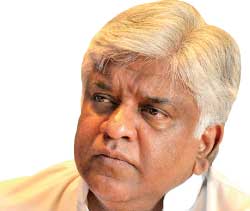 “I apologise to the public for the inconvenience caused,” said subject Minister Arjuna Ranatunga speaking to media on Monday. “But if I approved the distribution of this substandard oil and if it was mixed with other fuel in the stations, there would have been a bigger problem.
“I apologise to the public for the inconvenience caused,” said subject Minister Arjuna Ranatunga speaking to media on Monday. “But if I approved the distribution of this substandard oil and if it was mixed with other fuel in the stations, there would have been a bigger problem.
This would not have been such an issue but this panic situation was created through a series of text messages which were sent out by an organized group. Today the issue has blown out of proportion to the extent that people have started collecting petrol in bottles and cans and have started their own businessess. The next ship is supposed to reach Lankan waters on the night of November 8, and by November 9, this petrol issue will be controlled. There is no issue with diesel and stocks are sufficient for the next two or three weeks.
The storage capacity for petrol is only 90,000 MT in the storage facilities we have
I have been asked if I would investigate into the matter but right now what I want is to get down petrol and nothing else. We will also be implementing a mechanism to stop bringing in substandard fuel. For the next few days, 2500 MTs of fuel will be distributed but due to a higher demand, several stations have a tendency of running out of petrol.
“The storage capacity for petrol is only 90,000 MT in the storage facilities we have. A ship usually has a capacity of 40,000 MT. As such, a ship arrives when this amount is needed. Otherwise it would be quite costly to import shipments as and when required. Due to this situation, there is a 1.5% increase in the demand for petrol in stations, islandwide,” he added.
The responsible company(s) should be blacklisted :Wasantha Samarasinghe
 Airing his views about this issue, JVP politburo member and Voice Against Corruption Convener Wasantha Samarasinghe said that if a company (supplier) delays to send their shipments or sends substandard fuel then they have to be blacklisted. “They are putting an entire country at an inconvenience. Therefore this issue cannot be taken on a lighter note. Because of this crisis, the government moves to obtaining Spot Tenders instead of Term Tenders and because of this, the loss incurred in more than Rs. 5,836 million.
Airing his views about this issue, JVP politburo member and Voice Against Corruption Convener Wasantha Samarasinghe said that if a company (supplier) delays to send their shipments or sends substandard fuel then they have to be blacklisted. “They are putting an entire country at an inconvenience. Therefore this issue cannot be taken on a lighter note. Because of this crisis, the government moves to obtaining Spot Tenders instead of Term Tenders and because of this, the loss incurred in more than Rs. 5,836 million.
The other issue is that these ‘Spot Tenders’ are also given by the same people who give ‘Term Tenders’ and in this situation they give their shipments at a higher price. As a result, everyone has to buy fuel at a higher cost today. The government has to be responsible for this entire fiasco and people have now observed the so-called ‘good governance’ they all spoke about.”
Because of this crisis, the government moves to obtaining Spot Tenders
Lack of adequate storage facilities needs to be addressed : CPCWU
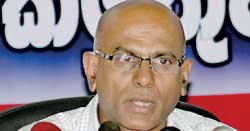 In his opinion, General Secretary of the Ceylon Petroleum Common Workers’ Union (CPCWU) D. J. Rajakaruna said that the main reasons for this fuel shortage are the delay in this particular shipment and the lack of adequate storage facilities. “If the country cannot store fuel then it is an issue that the government has to address immediately.
In his opinion, General Secretary of the Ceylon Petroleum Common Workers’ Union (CPCWU) D. J. Rajakaruna said that the main reasons for this fuel shortage are the delay in this particular shipment and the lack of adequate storage facilities. “If the country cannot store fuel then it is an issue that the government has to address immediately.
The issue with CPC fuel is that its stores are less but the consumption is high. There are 99 tanks in Trincomalee but only eight are being used by IOC. A cabinet approval was then given to give 10 tanks to CPC but this was not allowed. But instead the government decides to lease these tanks to IOC. But if these tanks had been given to CPC we could have saved the money and converted it into an international storage facility on the long run.
This is the main reason why we filed a case as well. We saw this issue coming and we warned the government as well, but they didn’t take any notice. The Sapugaskanda Oil Refinery needs refurbishing and it would shut down any time. So without looking at these issues, the government is keener in leasing the Trincomalee Oil Tanks to India. I think we do not need IOC in Sri Lanka at all, because more than the concerns of the people they are aiming at the oil tanks in Trinco.”
If a shipment is delayed, legal actions could be taken upon inquiry.
The trade union stated that if substandard oil is sent, there’s a tendency for the company [supplier] to get blacklisted but it depends on the agreement between the supplier and the buyer. In addition to that if a shipment is delayed, legal actions could be taken upon inquiry.
The trade union also confirmed that at this point, before the government takes action on its delay the ship has to immediately distribute its fuel upon arrival accordingly as people are already facing a crisis. Usually if a ship delays, it will be a disadvantage for the ship (supplier) as they will have to dock their ships for a long time and it would cost them a lot of money.
The supplier may be blacklisted Shyam Bohra, MD - LIOC
Speaking to the , Managing Director of LIOC Shyam Bohra said that legal actions would be taken against the supplier and it could even go to the extent of blacklisting. “It was the fault of the supplier; M/s TOTAL, a French Multinational Company who had sent some fuel with visible particles. Immediately after the rejection, we sent this ship back and we are yet to receive a new stock on November 10. As far as the specifications are concerned the product has failed to meet the quality compliance process. When the samples were tested at the CPC/CPSTL laboratory the fuel contained some visible particles and therefore the stock was rejected.
As far as the specifications are concerned the product has failed to meet the quality compliance process
On this note, we requested the supplier to replace the cargo. We have been buying fuel from this supplier for the past four to five years and this is the first instance we had a problem. LIOC has not distributed low quality fuel and this could be confirmed through past records.”
He further said that 3500 MT of petrol was still available and some quantity of petrol is also generated from the LIOC Trincomalee Terminal. “The present situation is mainly due to the fact that the stock of petrol imported by CPC has got delayed and M/s TOTAL is taking time to replace the cargo.”

Trincomalee Oil Tank Farm
The Trincomalee Oil Tank Farm entail a great deal of engagement in Indo-Lanka relations.
The then United National Party (UNP) led government signed a tripartite agreement in February 2003 to develop the oil tank farm with India.
The parties of this agreement included the government of Sri Lanka [GoSL], Lanka IOC [Pvt] Ltd. [LIOC] and Ceylon Petroleum Corporation [CPC]. As per the lease agreement, the oil tank farm with 99 tanks was to be handed over to the LIOC for use for a period of 35 years.
Accordingly, they started using 14 tanks in the lower farm area. The remaining 84 tanks in the upper tank area were not in use. Back in March 2015, during the Indian PM’s visit to Sri Lanka it was agreed that Lanka IOC [LIOC] and the CPC would jointly develop the Upper Tank Farm of the China Bay Installation in Trincomalee on mutually agreed terms.

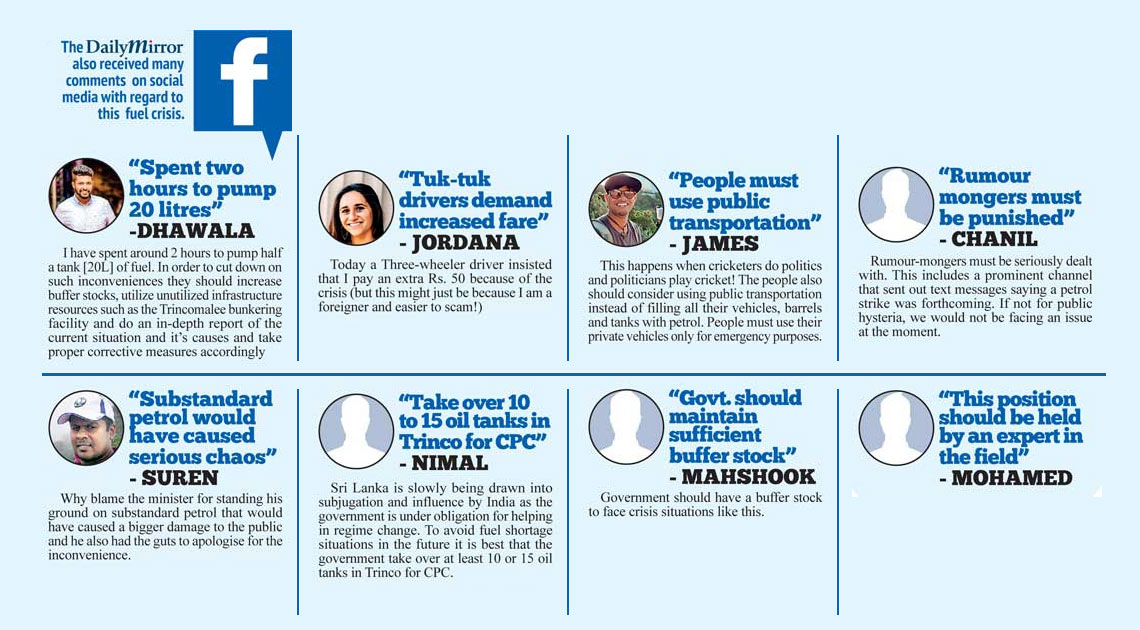
23 Dec 2024 1 hours ago
23 Dec 2024 2 hours ago
23 Dec 2024 2 hours ago
23 Dec 2024 3 hours ago
23 Dec 2024 3 hours ago